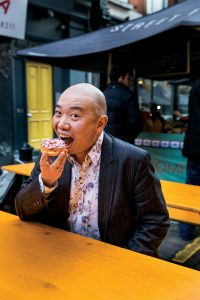Lifestyle
Are our genetics to blame for our weight?

Dr Giles Yeo, Image Credit: Scott Chasserot
With 63% of Brits now carrying too much weight, Senior Health & Beauty Writer, Ellie Smith, asks Dr Giles Yeo whether we’re simply eating too much, or whether our genetics carry weight too. Read on to discover the fascinating connection between genetics and weight, the science behind weight-loss woes, and Dr Yeo’s top tips for those who have been dealt an unfortunate genetic hand.
Dr Giles Yeo decided to research the genetics of obesity after a PhD at the University of Cambridge where, in his own words, he ‘quickly realised that studying the genetics of Japanese puffer fish wasn’t going to pay the mortgage’. He would have been hard-pressed to find a more topical field of research. With more of us overweight and obese than not in the UK (the current figure stands at 63 per cent), the strain on our belts and on our health service has never been greater.
Despite the scale of the obesity crisis, however, Giles is sometimes met with frostiness when he reveals that he specialises in genetics and weight. He believes this hostility springs from a suspicion that, as a geneticist, he’s giving obese and overweight individuals an ‘excuse’ for what most believe to be a preventable and largely self-inflicted ailment. In his new book, Gene Eating, Giles responds to this societal anxiety, tackling the prevailing belief ‘that we are in full “executive control” of our own eating behaviour; that our environment is responsible for our shape and size, and that our genes […] have minimal, if any, effect’.
Is there a link between genetics and weight?
There’s no doubt that losing weight is a struggle for most, and the biological reason for this is simple. Our bodies will fight tooth and nail against shedding pounds because weight-loss is associated with a reduced chance of survival. As Giles puts it: ‘How much fat you’re carrying is essentially how long you would last without food.’ As our precious fat stores begin to dwindle, the body activates a starvation response, reducing metabolism and ramping up our hunger hormones. Interestingly, however, research shows that genetic differences can make this starvation response more potent in some than others.
At the extreme end of the scale are kids who, as Giles details in his book, have ‘their freezer doors padlocked, because otherwise they would get in and eat frozen fish fingers’. In reality, the majority of us are somewhere closer to the centre, genetically predisposed to be a little more or less hungry and carry a little more or less weight. According to Giles, the ‘heritability of weight is actually close to that of height’. While no one would dispute that tall parents tend to have tall children, our genetics and weight can be similarly linked. Our genes can influence our body shape (where we store fat, for example), our taste preferences and our eating habits. Giles explains that genetics and weight are much like a hand of poker: ‘You could get a good hand or you could get a bad hand, and the only people you can blame are your folks.’ Take a peek at mum and dad and we’ll get a pretty clear picture of what we’re likely to see looking back at us in the mirror.
It’s no surprise then that our desire to squeeze into a minuscule bikini this summer might not stand a chance against genetic misfortune and biological defences that have evolved over thousands of years to improve our chance of survival. Though hardly comforting, Giles suggests that obesity could even be described as the ‘natural’ or ‘highly evolved’ response to 21st-century life: ‘We are simply preparing ourselves for a famine that is never going to arrive.’
Can we overcome our genetics?
While he doesn’t suggest obesity is something to be celebrated (Gene Eating makes it very clear that carrying extra weight increases risk of heart disease, type 2 diabetes and cancer), Giles is keen to moderate the sometimes-ferocious judgement directed at the heavier in society. ‘Imagine trying to stop eating when you’re still hungry,’ he writes. ‘It’s difficult, even for one meal, because it’s not what we are designed to do. Now imagine feeling slightly more hungry in this food environment and trying to halt the eating process every single day, for every single meal, for your whole life – that is what overweight and obese folk go through.’ Obese people are not ‘morally bereft, lazy or bad,’ he concludes. ‘They are simply fighting their biology.’
Though genes are certainly powerful, Giles is clear that those eager to improve their health need not give up hope. ‘You can win with a bad hand of poker,’ he explains. ‘It’s more difficult, but you can do it – and you can certainly lose with a good hand of poker.’ To use another analogy, Giles admits he will never be able to run as fast as Usain Bolt: ‘A large part of this is going to be down to my genes but that doesn’t mean that if I trained, I wouldn’t be able to run faster than I can now,’ he adds.
How to keep weight-loss on track
For those determined to battle their biology, he cautions against radiant Instagram influencers flogging fairy-tale solutions to weight-loss woes. ‘For most that have made their way to influencer status, their figure, complexion and looks are largely down to genes, with a dash of surgery here and there,’ he stresses.
Before parting with our hard-earned cash or indulging in a shame-induced binge, it’s important to remember that these Insta bikini bods may have more to do with genetics than the supplement shake placed artfully in the frame. For Giles, focusing on aesthetics is counterproductive: ‘We need to be worried about our health first,’ he argues. ‘In my mind, if we concern ourselves with our health, our weight will take care of itself. We might not look like Angelina Jolie, but at least then we will be healthy.’
In the light of Giles’ research, perhaps a more compassionate approach to the challenges faced by those battling obesity will help to treat a disease that simplistic and disciplinary ‘eat less’ guidelines are dramatically failing to tackle. While working on TV programme What’s The Right Diet For You? for the BBC, Giles was struck by the difference that understanding the ways their genes had conspired against them made to the show’s ‘constant cravers’. What one participant confided in Giles has stuck with him ever since: ‘I have been large all my life and was made fun of as a kid at school. I’ve been called some very awful things as an adult that I won’t repeat. I know there’s no magic pill but now I know that when I am finding it really difficult to say no to food, when the weight just won’t go off, that I’m not a bad person. It’s difficult because I’m fighting my genes and that makes a huge difference in motivation for me.’
Listen to Dr Giles Yeo chatting to Liz in her podcast about why diets don’t work.
Read Dr Giles Yeo’s book,Gene Eating: The science of obesity and the truth about diets
Follow Dr Giles Yeo on Instagram.
Please note that this page contains affiliate marketing links, which means that we may receive a small commission from the products purchased via this article. However, we would only ever recommend products that have been tried and tested by Liz or the Wellbeing team.





